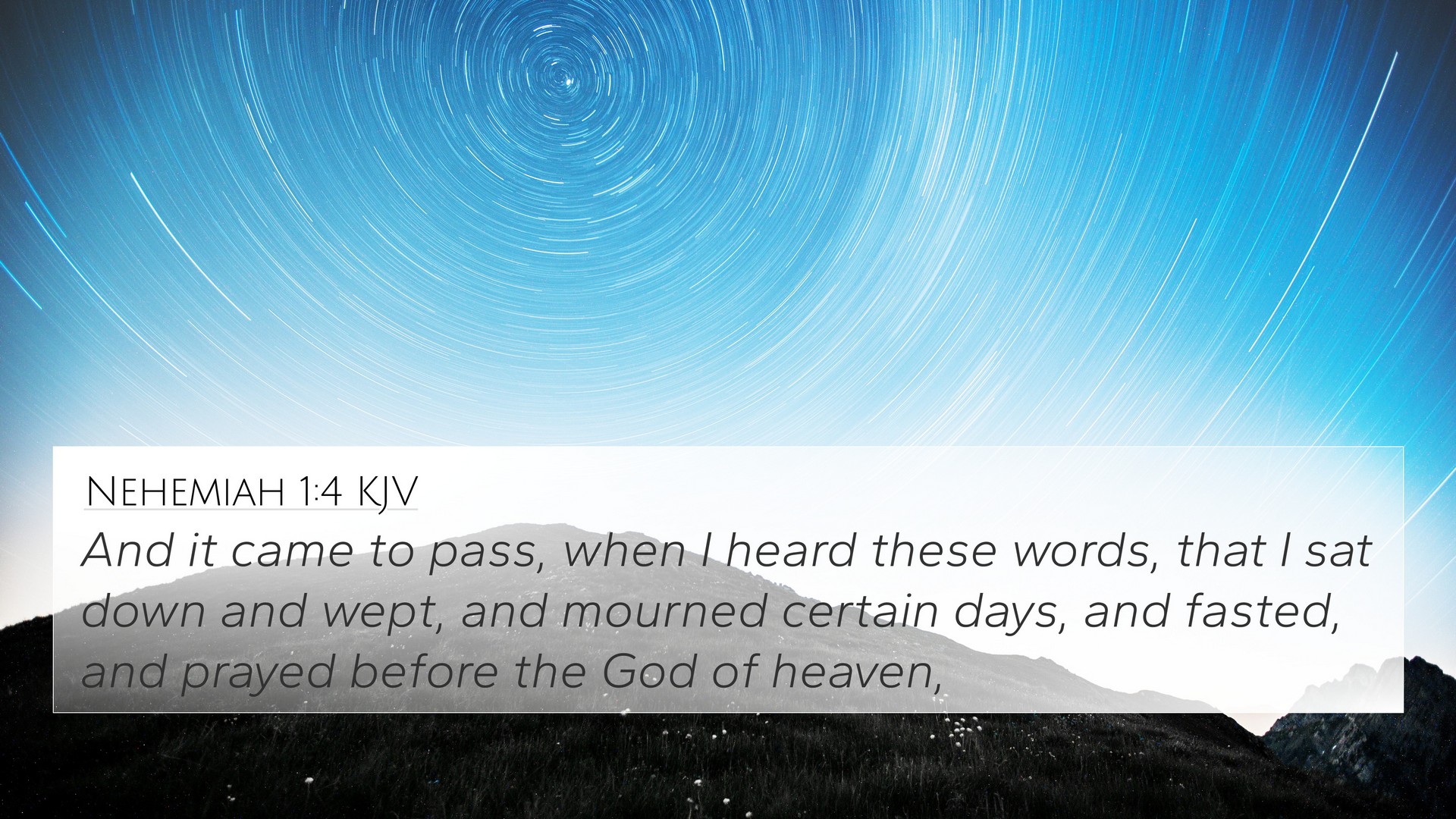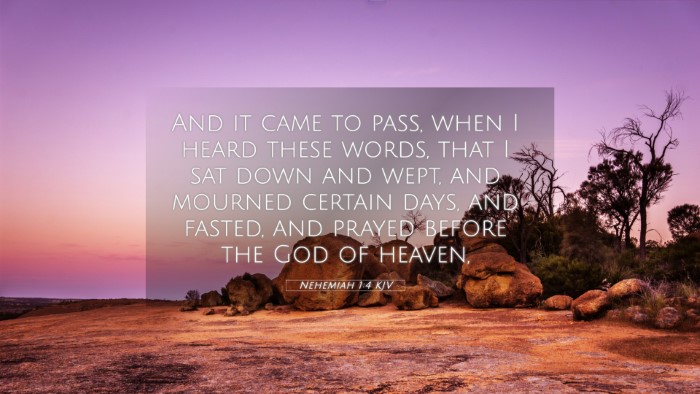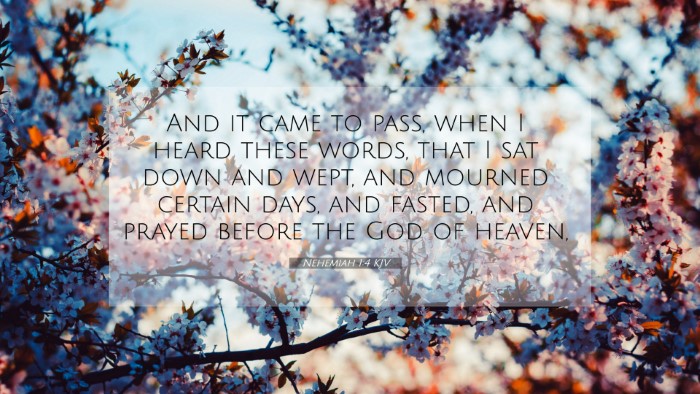Old Testament
Genesis Exodus Leviticus Numbers Deuteronomy Joshua Judges Ruth 1 Samuel 2 Samuel 1 Kings 2 Kings 1 Chronicles 2 Chronicles Ezra Nehemiah Esther Job Psalms Proverbs Ecclesiastes Song of Solomon Isaiah Jeremiah Lamentations Ezekiel Daniel Hosea Joel Amos Obadiah Jonah Micah Nahum Habakkuk Zephaniah Haggai Zechariah MalachiNehemiah 1:4 Similar Verses
Nehemiah 1:4 Cross References
And it came to pass, when I heard these words, that I sat down and wept, and mourned certain days, and fasted, and prayed before the God of heaven,
Uncover the Rich Themes and Topics of This Bible Verse
Listed below are the Bible themes associated with Nehemiah 1:4. We invite you to explore each theme to gain deeper insights into the Scriptures.
Nehemiah 1:4 Cross Reference Verses
This section features a detailed cross-reference designed to enrich your understanding of the Scriptures. Below, you will find carefully selected verses that echo the themes and teachings related to Nehemiah 1:4 KJV. Click on any image to explore detailed analyses of related Bible verses and uncover deeper theological insights.

Daniel 9:3 (KJV) »
And I set my face unto the Lord God, to seek by prayer and supplications, with fasting, and sackcloth, and ashes:

Psalms 137:1 (KJV) »
By the rivers of Babylon, there we sat down, yea, we wept, when we remembered Zion.
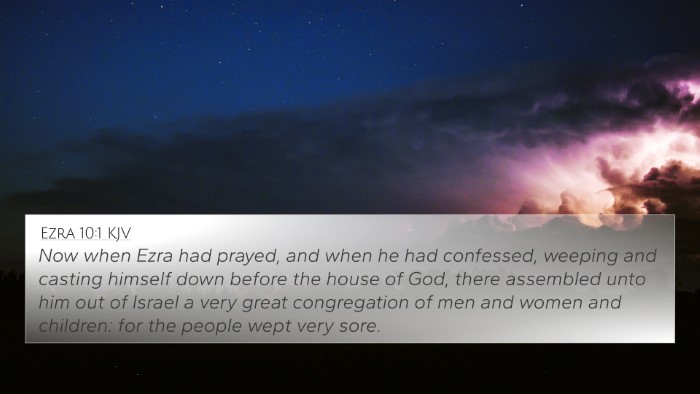
Ezra 10:1 (KJV) »
Now when Ezra had prayed, and when he had confessed, weeping and casting himself down before the house of God, there assembled unto him out of Israel a very great congregation of men and women and children: for the people wept very sore.
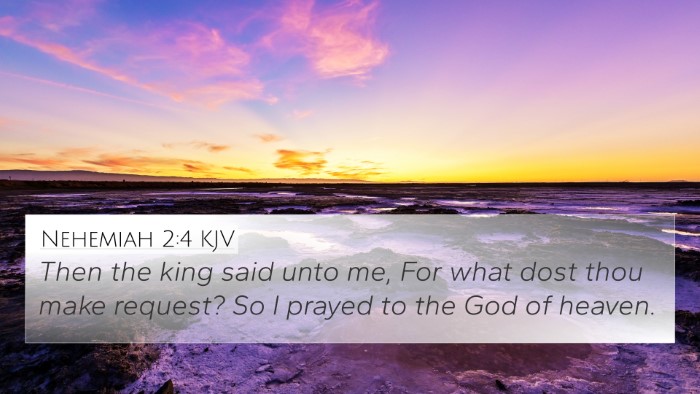
Nehemiah 2:4 (KJV) »
Then the king said unto me, For what dost thou make request? So I prayed to the God of heaven.

Psalms 69:9 (KJV) »
For the zeal of thine house hath eaten me up; and the reproaches of them that reproached thee are fallen upon me.

Psalms 102:13 (KJV) »
Thou shalt arise, and have mercy upon Zion: for the time to favour her, yea, the set time, is come.

Zephaniah 3:18 (KJV) »
I will gather them that are sorrowful for the solemn assembly, who are of thee, to whom the reproach of it was a burden.

Jonah 1:9 (KJV) »
And he said unto them, I am an Hebrew; and I fear the LORD, the God of heaven, which hath made the sea and the dry land.

Daniel 2:18 (KJV) »
That they would desire mercies of the God of heaven concerning this secret; that Daniel and his fellows should not perish with the rest of the wise men of Babylon.
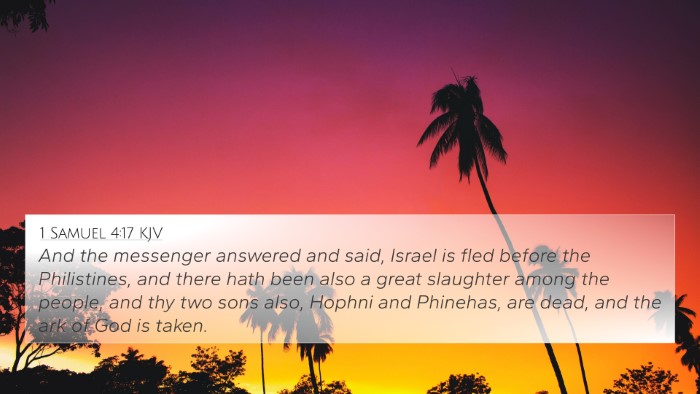
1 Samuel 4:17 (KJV) »
And the messenger answered and said, Israel is fled before the Philistines, and there hath been also a great slaughter among the people, and thy two sons also, Hophni and Phinehas, are dead, and the ark of God is taken.
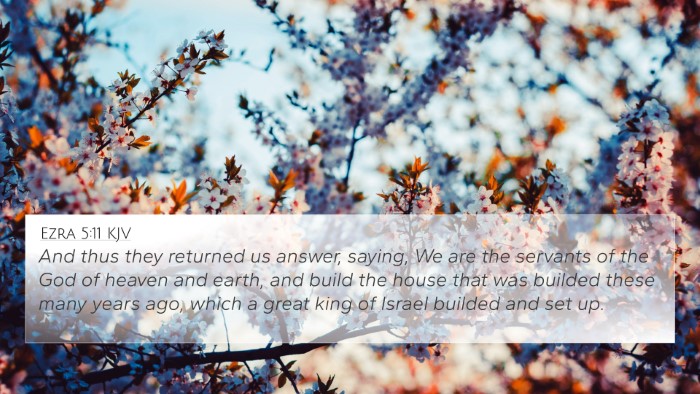
Ezra 5:11 (KJV) »
And thus they returned us answer, saying, We are the servants of the God of heaven and earth, and build the house that was builded these many years ago, which a great king of Israel builded and set up.

Ezra 9:3 (KJV) »
And when I heard this thing, I rent my garment and my mantle, and plucked off the hair of my head and of my beard, and sat down astonied.
Nehemiah 1:4 Verse Analysis and Similar Verses
Understanding Nehemiah 1:4
Nehemiah 1:4 states: "When I heard these words, I sat down and wept, and mourned certain days, and fasted, and prayed before the God of heaven." This poignant verse marks the beginning of Nehemiah's personal response to the news of Jerusalem's desolation. It is rich with emotional depth and spiritual significance, inviting readers to reflect on their own responses to grief and prayer.
Summary of Insights from Public Domain Commentaries
This verse encapsulates the profound sorrow Nehemiah felt upon hearing of the plight of his homeland. His reaction comprised not just emotional sorrow but also a commitment to prayer and fasting, suggesting the seriousness with which he approached the situation. Below are insights combined from the commentaries of Matthew Henry, Albert Barnes, and Adam Clarke.
Emotional Response
Matthew Henry emphasizes that Nehemiah's tears reflect a deep concern for the glory of God and the state of His people. His mourning aligns him with the prophetic tradition where sorrow leads to intercession. Henry suggests that we should show similar compassion towards the sufferings of our communities.
Spiritual Commitment
Albert Barnes highlights that Nehemiah's extended time of mourning and prayer indicates a serious commitment to seeking God's intervention. He notes that fasting is often accompanied by a significant request to God, showing Nehemiah’s desire for divine guidance and help for Israel. Barnes encourages believers to prioritize prayer in times of distress.
Intercession for Jerusalem
Adam Clarke points out that Nehemiah’s actions are not only personal but represent a profound intercession for his people. Clarke mentions that this moment could be seen as preparatory for Nehemiah’s future leadership role. He encourages readers to understand intercession as a powerful tool for change.
Cross-References Related to Nehemiah 1:4
Several Bible verses echo the themes found in Nehemiah 1:4, offering a deeper understanding through related scriptures:
- Psalm 126:5-6: "Those who sow in tears shall reap in joy." This verse connects Nehemiah's sorrowful state with the eventual restoration of joy.
- Daniel 9:3: "And I set my face unto the Lord God, to seek by prayer and supplications, with fasting..." Daniel’s call to prayer underlines the importance of seeking God in critical times.
- Ezra 10:6: "Then Ezra rose up from before the house of God, and went into the king's palace..." This highlights the approach of leaders in mourning for the community.
- Matthew 5:4: "Blessed are those who mourn, for they will be comforted." This New Testament reflection on mourning ties back to Nehemiah's emotional distress.
- James 5:16: "The prayer of a righteous person is powerful and effective." This supports the notion of Nehemiah's prayer being impactful.
- Romans 12:15: "Rejoice with those who rejoice; mourn with those who mourn." This highlights the community aspect of shared emotions.
- 2 Chronicles 7:14: "If my people, who are called by my name, will humble themselves and pray..." This reflects the call to prayer and humility before God, much like Nehemiah's response.
Connections Between Bible Verses
The connections between Nehemiah 1:4 and other verses can help us understand God’s message more holistically. Cross-referencing Biblical texts allows for a richer comprehension of themes such as intercession, community distress, and divine response.
Thematic Bible Verse Connections
- Grief and Mourning: Nehemiah's weeping connects with the broader Biblical theme of lament, showcasing how these emotions are valid and often lead to divine action.
- Prayer and Fasting: This practice is found throughout the scripture as a tool for deepening one's relationship with God, especially in times of need.
- Community Restoration: Nehemiah's sorrow is for Jerusalem, highlighting the communal aspect of faith and God's plans for restoration.
Comparative Bible Verse Analysis
Engaging in a comparative study of Biblical texts surrounding Nehemiah’s experiences reveals how themes of grief, prayer, and community are interwoven throughout scripture. For instance, Nehemiah's emotional response mirrors the lament found in the Psalms and the prophetic cries of the Old Testament, establishing a significant inter-Biblical dialogue concerning human suffering and divine care.
Tools for Bible Cross-Referencing
For those seeking to delve deeper into these themes, utilizing tools for cross-referencing can be immensely helpful. Bible reference resources such as concordances and cross-reference guides serve as excellent aids for exploring the links between verses, enriching one’s understanding of scripture.
User Intent: Finding Relevant Bible Verses
Readers might wonder: What verses are related to Nehemiah 1:4? or How do emotional responses in the Bible compare? By examining parallels such as those found in Psalms or the teachings of Jesus, one can discover how interconnected God's message is throughout scripture.
Conclusion
Nehemiah 1:4 serves as a profound reminder of the power of grief and prayer. By studying this verse in conjunction with others, readers can gain deeper insights into God's character, His willingness to listen, and the transformative impact of communal mourning and intercession. Scriptural cross-referencing not only opens pathways for understanding but also invites believers to engage in a larger dialogue within the text.
